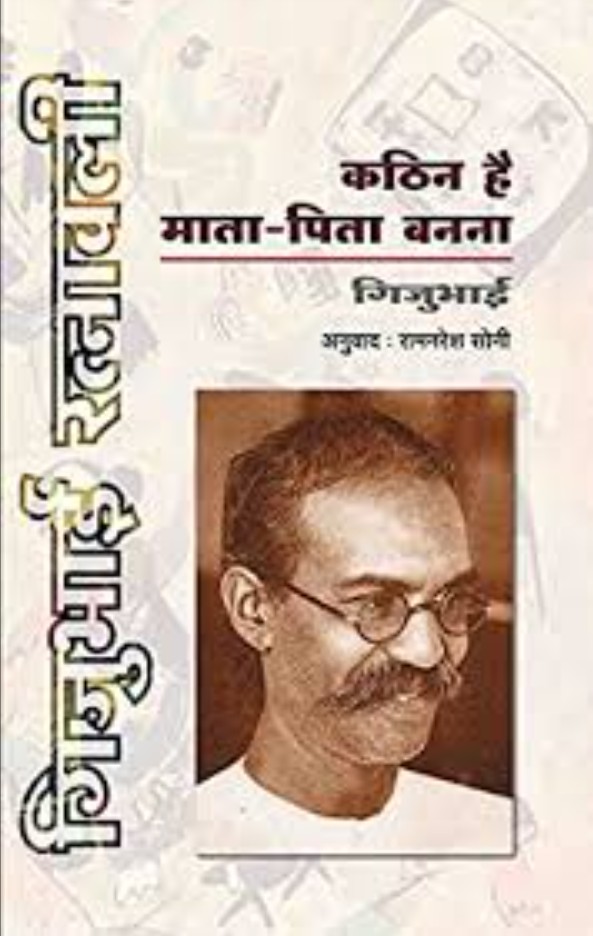Life Sketch :
Gijubhai's full name was Girjashankar Bhagwan Ji Badheka. He was born on 15 November 1885 in Chittal village of Saurashtra region in Gujarat. His father's name was Shri Bhagwan Ji Badheka and his mother's name was Mrs. Kashiva. Gijubhai received law education and also practiced for some time. Gijubhai became the legal adviser to Dakshinamurthy Bhavan in 1915, after leaving the practice.
Dakshinamurthy Vidyarthi Bhavan was established in Bhavnagar Gujarat. In this institution, Hargovind Pandaya, uncle of Giju Bhai was employed. Through whom Gijubhai received lifetime membership in Dakshinamurthy Vidyarthi Bhavan, Gijubhai started working as an Acharya in Vidyarthi Bhavan run by this institution and attempts to understand psychology. In 1920, Gijubhai established his own "Bal Mandir" in Dakshinamurthi Bhavan. In 1922, a new building of this Balmandir built on the tekdi near Takhteshwar Mahadev Temple in Bhavnagar. Which was inaugurated by Kasturba Gandhi.
In this Balmandir, there was a system of education for children between the ages of 2.5 to 6 years. In this Balamandir, Gijubhai provide an environment of education in accordance with his educational philosophy. The atmosphere of this Balmandir was euphoric, cordial where children were educated through poetry, story, songs, drama, entertainment, excursion, sports, dance, gardening etc.
Gijubhai was highly influenced by Maria Montessori, that's why he founded the Montessori Association in 1925 and organized the Montessori Conference in Bhavnagar in 1925 and the second Montessori Conference in 1928 in Ahmedabad. Also, in view of the lack of qualified teachers, a "teacher temple" was also established for the training of the teachers.
Gjubhai did many works on Gujarati children's literature during lifetime. He is known as the author of Gujarati children's literature. He wrote his 15 original books and wrote 223 books with the help of other colleagues Among his books, the most popular books are "Montessori method', 'Diwaswapn', and 'katha kahani ka shatra'.
Apart from this, Gijubhai used to edit a magazine called 'Shikshan Patrika' in Gujarati. Later it was also published in Marathi and Hindi. In this magazine Gijubhai gave more importance to his children's world and expressed in detail the learning process of children. Gijubhai died on 23 June 1939 at the age of 54 in Mumbai. On his untimely demise, Mahatma Gandhi wrote, "Who am I to write something about Gijubhai? His works have always fascinated me. I am convinced that his work will go ahead."
Gijubhal's compositions:
1. Diwa swapn
2. Prathmik vidyalay ki shiksha
3. Shikshako se
4. Katha kahani
5. Maa baap banna kathin hai
6. Mata-pita ki matha pachchi.
7. Montessori shiksha paddhati
8. Aise ho shikshak
9. Chalte firte shikshak
10. Mata-Pita se
11. Mata-pita k prashn
12. Prathmik vidyalaya me bhasha shiksha
13. Prathmik vidyalaya me vyavsayik shiksha
14. Baal shikshan Jaise maine samjha.
The world of the child (Bal Jagat or Bal Mandir) of Gijubhai:
Children based on his educational ideas. The school that Giubhai started In 1920, Gjubhai founded Baimandir to provide education to children based on his educational ideas. The school that GijuBhai started was named Balmandir i.e. a place where education of children is arranged.
In this Balmandir, he made arrangements to educate children between the ages of 2.5 to 6 years. In Balmandir, there was a provision for children to stay, sleep, eat, etc. Gijubhai spent time with the children all the time, teaching them.
Gijubhal School was called Balmandir, according to him the school is a temple and the child is the god of that temple. The teacher act like a priest. The teacher should respect the child's personal qualities and help the child in all round development.
Gijubhai loved his school children so much that children used to call Gijubhai affectionately as 'mother with mustache'.
Gijubhai derived his concept of Balamandir from the 'Balgriha of Montessori". In the Montessori Children's Home, the mentally retardant children were educated, while the Balmandir provided for the education to ordinary children.
Gijubhai and Teaching Principles:
1. Teaching should be in mother tongue.
2. Children should be taught to read first and write later.
3. Story and songs should be used in teaching.
4. Prayer should be used for religious and moral education.
5. The complete freedom should be provided to child.
6. Teaching aid and materials should be used in teaching.
7. Teacher should have knowledge of psychology.
GijuBhai's Objectives of education:
Gijubhai has stated the following objectives of education
1. Objective of physical development of the child.
2. Objective of mental development of the child.
3. Objective of moral development of the child.
4. Objective of spiritual development of the child.
5.Objective of development of human qualities in the child.
6. Objective of development of skilled citizenship.
7. Objective of development of creative powers in the child.
8. Objective of development of reasoning and thinking ability in the child.
Gijubhai and Curriculum:
Gijubhai used to give importance to the development of practical and creative knowledge in Balmandir, for this the following subjects have been included in curriculum -
1. Language knowledge
2. Mathematics
3. Music and dance education
4. Nature studies
5.Health









0 Comments